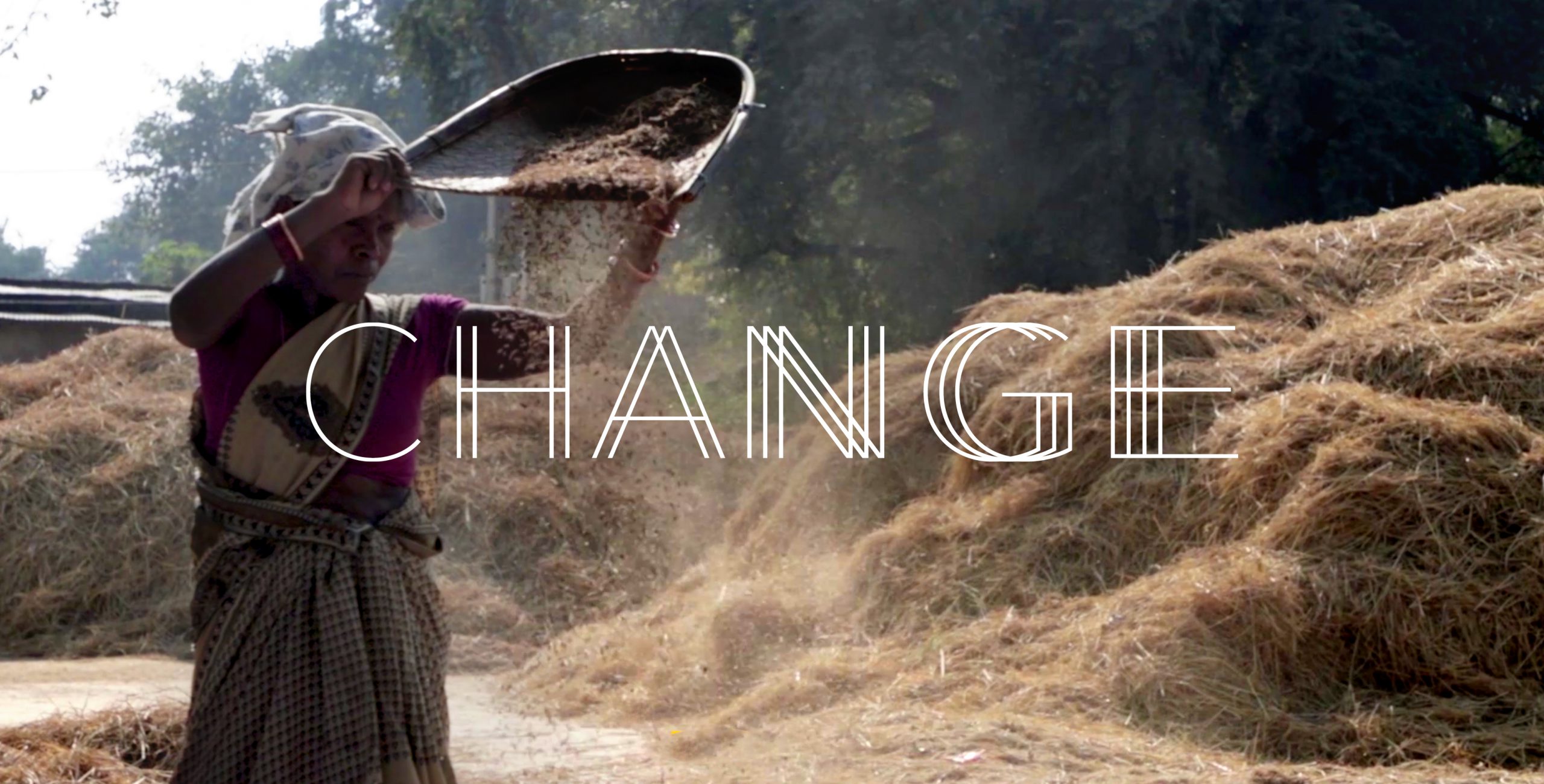Case Studies
Here are some recent case studies that show the partnership between Mlinda MCT and the people of West Bengal
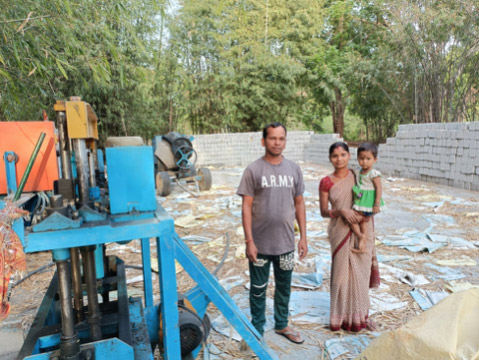
Bhimsen Sahu
Bhimsen Sahu lives in the village Samsera of Gumla Block. He had small land holding and the agriculture produces from this land was mainly for consumption purpose and not enough to provide year long food security. He also involved in transportation of goods through his tractor for additional income. When Mlinda established its Solar Mini Grid in the Samsera village he realized the advantage of electricity. He also came into the contact of local field officer, Mr. Sukanta Biswas of Mlinda and discussed with him for establishing suitable micro enterprise. That time there was substantial demand of bricks in the villages as people were involved in house construction as local govt. was providing monetary support for construction of dwelling unit.
Bhimsen thought of starting a cement brick unit but he has no proper knowledge about it. That time Mr. Sukanta Biswas advised him to get a three-phase cement brick unit and also helped him regarding procurement of the same. As Bhimsen had limited capital therefore, he took a loan Rs. 300000/- from the village organization and Rs. 200000/- from the bank. He started his enterprise of cement brick in November 2020.
Now his business is well established and he has provided wage employment to another 7-8 people who are paid around Rs.300/- per day. In last three years he has able to earn a profit of Rs.60000/- per year from his cement brick unit. He has able to provide good education to his son, who is studying in a residential school in Dhanbad (Industrial city of Jharkhand).
As his business has flourished therefore, he has taken a land adjacent to the main road and he is in a process of shifting his production unit from interior of the village to the main village road so that he can cater a greater number of customers.
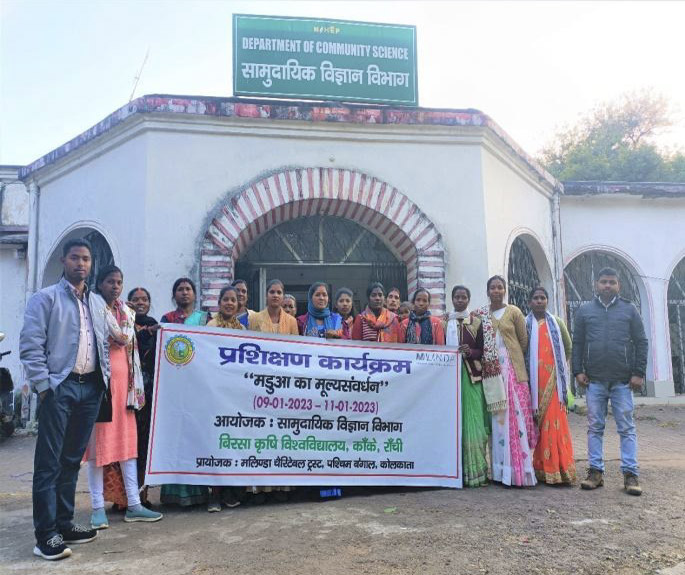
Madua Sahiya
Millet (Madua) is a very productive farm produce cultivated in the Gumla district. It has a very high yield under harsh climatic conditions. It is also resistant to pests and diseases, ensuring that the food basket of a farmer is never empty. If we talk about the market structure for millet in the district, majority portion of the produce is exported across the nation. The self-consumption of millet has gone down among the local population and it is limited to winter season. Developing and popularization of value-added products like Laddu, Idli, Dhuska, Nimki, Biscuits, Cake etc. from millet is the only option available where one can start consumption of millet.
In this backdrop MCT felt the need of training and exposure visit of local community members so that they could able to learn the skill to produce value added millet products. Initially 15 women members from different SHGs were identified for skill upgradation and three-day training was conducted in the month of January’23 at Birsa Agriculture University, where both theoretical and hand on training was provided for preparation of laddu, dhuska, nimki, biscuits, mixture etc.
After the training, trained women were encouraged to form a common group and thus “Madua Sahiya” was born. This was a collective of women who were trained and eager to set up their own outlets from there they could sell processed and value-added millet products.
They tested their first success in a local fair organized by the Teli community in Gumla town. MCT facilitated the participation of eight members of “Madua Sahiya” in the fair by arranging a stall inside the fair.
Various products made from millet was prepared by the women on the day of the fair. Every product of millet was equally demanded during the fair, laddu was one of the most demanded products and was sold within two hours of opening the stall. One of the women shared her experience of how they were engaged throughout the day dealing with the customer and making the products available as per the demand. The second most sold and demanded product was dhuska, served with green chutney, attracted most of the customers. Dhuska was ordered twice or thrice by the customers. Most of the products were also ordered as a takeaway for the family members. For the takeaway, proper packaging materials were used to ensure hygiene. They also ensured complete hygiene on-site of cooking food and the surrounding, which ensured to maintain quality standard of healthy food. At the end of the day when the sales data was shared, it was an unbelievable sale which reached the margin of nearly 63% over the total investment made by the women members.
Among the trained women members, one member Shakuntala Devi of kulabira village of Gumla district had done exceptionally well. As her family’s land holding was small therefore income from the farming was not enough to meet the rising cost of living. Earlier she was working with state livelihood promotion society as active woman to augment her household income. Training on value addition of millet provided her an alternative avenue of income. She also participated in the fair and when saw the demand of good millet products, she realized that products like laddu, duska, idli etc. had very good potential in the local market. She started preparing laddu in her household and sold them locally in the village. MCT helped her to got links with some govt. offices in Gumla like NABARD, RUDSETI etc. and she started supplying millet products to them. Within two-three months’ time she could able to sell millet products of Rs.40000/-. She also obtained FSSAI license and thinking of promoting the products with proper brand name.
Other group members like Kamala Devi had bought oven to start her own initiative of preparation of millet cakes and biscuits, another member Anita Devi started preparing millet mixture and selling them in her village.
MCT vision to bring millet into the food chain of daily food diet started with the training of the groups of women at BAU Ranchi and within a short span the initiative proved beneficial both for the trainees as well as customers as they were getting good quality millet products in their villages. It can be a small start but through this initiative, we can say it has a lot of potentials to create a market for the value-added products of millet.
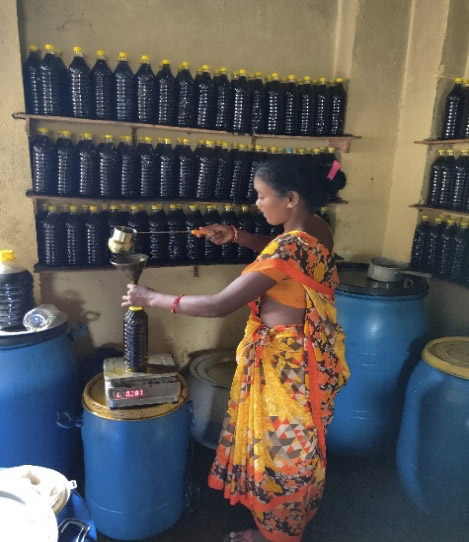
Bimati Devi
Bimati Devi is the operator of the oil expeller at Naratoli. She is a widow and belongs to the Kharia tribe. She lost her husband about four years ago when her younger daughter was about one year old. Loss of her husband put her in a very difficult situation with two young daughters. Her husband used to work as a mechanic in local garage and the sole bread earner.
After her husband’s death she started working as a daily wage earner in the village. But there was no guaranty that she would get work regularly. So, when the micro enterprise on mustard oil by the women of Farmers Producers Organization named Gumla Mahila Kisan Swawlamban Trust started in February 2022, it opened up a new opportunity for earning an assured monthly income.
She started working as an operator in the oil expeller unit. As she had never handled machines before, she was provided hands on technical training by the staffs of Mlinda to inculcate the required technical skills. To everyone’s surprise she demonstrated a keen interest to learn and soon became expert operator.
The Job of operator provided her a stable income of Rs.6000/- per month which is a lot considering her situation and irregular employment as a daily wage earner. This earning helped her to meet the household expenses and also the cost of education of her elder daughter who was studying in class VI.
Earlier she was not treated very well by her neighbours or other family members due to her poor economic condition but with a source of regular employment and income the attitude of others towards her has also changed and now she is treated well by them. The work of operator has enhanced her self-belief and enabled her to explore new avenues of income. She is now thinking of starting a side business of selling mustard oil with a commission which can help her to earn some extra money.
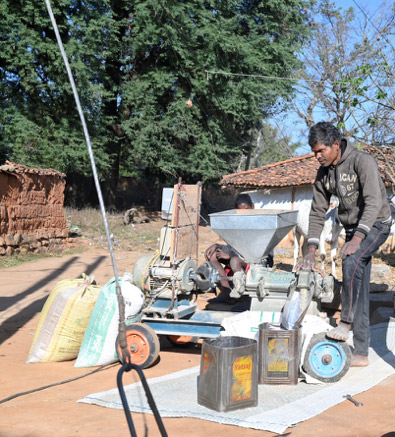
Ranjit Oraon
Ranjit Oraon was a mid-size land holder with land holding of 5 acre and his main occupation was cultivation. In the year October 2019, Mlinda established its Solar Mini Grid in the village Khora of Gumla Block. That time he first realized the facility of continuous energy supply in the household as he was having a domestic connection. As he was looking for the avenues to enhance his income as the selling of primary agriculture produces would not able to fetch good money. He came into the contact of the field officer of Mlinda who stayed at their village 24*7 for the maintenance of the solar grid. As per his suggestions he took up the activity of installing de-husking facility of paddy in his house. He was short of fund as he was able to collect only Rs.8000/- by selling the paddy. But the cost of the machine was Rs.45000/-. To enable him to start his micro enterprise, Mlinda provided EMI facility to Ranjit so that he could start his small de-husking unit.
He had to pay Rs.1500/- per month as EMI and he completed the repayment on time. From the profit of the Rice Huller Machine, he was able to expand his business and in February 2022, he purchased a 5 HP Pulverizer machine worth Rs.60000/-. For this machine he provided Rs.15000/- as down payment and rest was provided to him by Mlinda in Loan. He has also completed that loan by paying Rs.9000/- per month in EMI.
With the help of Mlinda now he has become a successful entrepreneur. He is taking good care of his family. Among the four kids he has having, two of them go to private school for education and rest two are two young to join school.
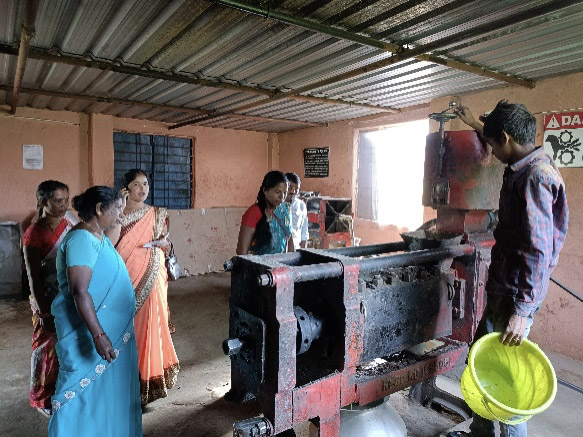
Sisai Aajeevika Mahila Cluster Sangathan Swawlambi Sahkari Samiti Limited
Jharkhand is known for its abundance of forest and its forest produces. Collecting non timber forest produce is a source of secondary livelihood for number of tribal households in the state as well as Gumla District. Karanj is one of the most collected NTFPS in Jharkahnd.
In Jharkhand during “Deepawali” Utsav there was a huge demand for Karanj Oil. It was common believe that, burning earthen lamps with Karanj oil during the evening of Deepawali is very auspicious. Except as burning fuel, Karanj oil has other medicinal usage also and there is demand for the same throughout the year for medicinal usages.
As CLFs promoted by the Jharkhand State Livelihood Promotion Society were looking for business opportunities, MCT proposed them the business model of Karanj seed Processing for oil extraction at Bhandaria of Gumla district. Karanj was collected by the rural households in the area where the processing unit is situated and CLF could easily collect and aggregate karanj seeds from local collectors.
After deliberation the CLF members understood the potential of Karanj Oil extraction. As it was the first year therefore, they purchased limited quantity of raw material to cater the Deepawali market. The ran the machine for 81 hours in the month of September and October and produced around 1687 liter of Karanj oil. In those two months effort they could able to earn Rs.269000/- from the sale of oil and karanj cake (byproduct).
They also started one turmeric processing unit at Bhandaria with the help of MCT. MCT financed a part of the required fund to modify the existing “Atta Chakki” machine to grind the turmeric and the rest amount was invested by the CLF. Till 31st March’23 they earned Rs.34400/- by selling 172 kgs of turmeric powder.
In both cases MCT provided hand holding support for both backward and forward linkages to run the machines effectively to the women members. After getting FSSAI license they have started selling their products with brand name “Vidya Sakhi”.
Running two different set of enterprises helped the CLF members to enhance their confidence and they were determined to continue their business in larger scale. Active members of the CLF like Manju Devi and Asha Devi were certain that with the support of MCT they would be able to run both the units to their full potential throughout the year.

